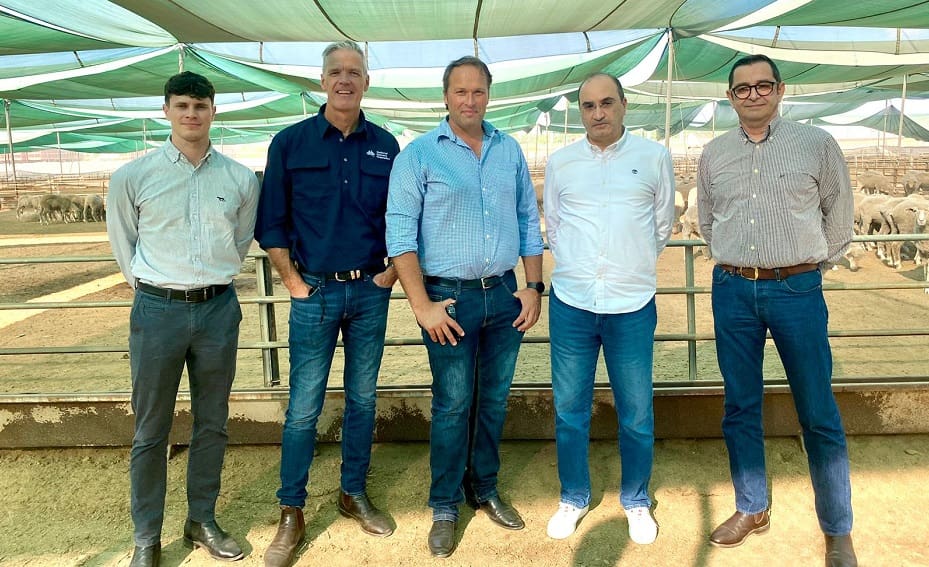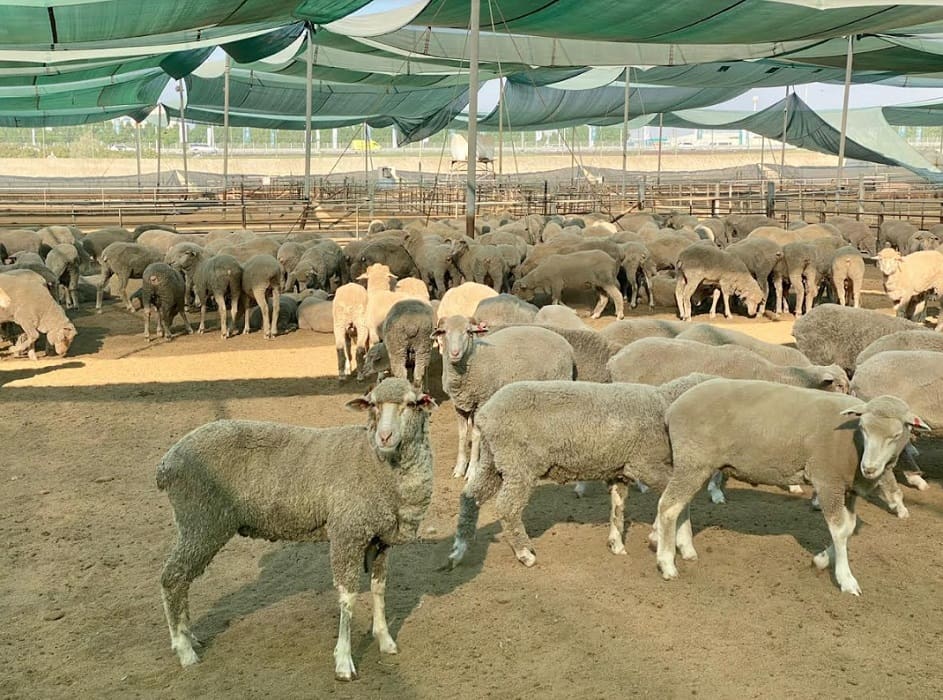
At the Jebel feedlot, from left, were KLTT executive director Hussam O.Sarhan, NFF chief executive Tony Mahar, NFF president David Jochinke, KLTT commercial director Serge Bassier and NFF policy officer, international engagement Harry Young.
LIVE sheep exports and the climate sustainability of Australia’s livestock industry were on the agenda for Down Under visitors to the United Nations climate change summit COP28 in the United Arab Emirates city Dubai this week.
The National Farmers’ Federation has NFF president David Jochinke and chief executive Tony Mahar gained a firsthand perspective of what banning the live sheep export trade will have on the people in the Middle East.
While in Dubai for COP28, the NFF leaders toured the Trans Emirates Livestock Trading’s 80,000-sheep feedlot owned by Al Mawashi in the Jebel Ali Free Zone.
Trans Emirates Livestock Trading L.L.C. is a subsidiary of Al Mawashi, established in the United Arab Emirates in 1982 for the purpose of trading in livestock and meat products. Al Mawashi is a public share holding company for the processing, transporting and trading of all types of meat, and its Kuwait Livestock Transport and Trading Co subsidiary Rural Export and Trading (WA) has been a major exporter of Australian sheep.
Mr Jochinke said the feedlot is a well-organised, clean facility with robust animal welfare standards.
“We’ve gained a greater understanding of why the live sheep trade is so important to the people in the Middle East who simply don’t have the climate to raise sheep or the infrastructure to support processed sheep meat,” he said.
“It was made crystal clear to us, while their preference is to source sheep from Australia, if the trade is banned, they will find an alternative country to trade with.
“We know Australia’s animal welfare standards and practices are world-leading and Australian sheep are cared for before, during and after they are shipped,” Mr Jochinke said.
“If the Albanese Government genuinely cares about animal welfare and Australian farmers, it will reverse its decision to ban this trade.
“I encourage the Prime Minister to come and see for himself the facility in the Middle East and to have conversations with the people here who want to continue trading with us,” he said.

Australian sheep in the Jebel feedlot.
Strong interest in Australia’s livestock sustainability progress
MEAT & Livestock Australia said the Australian livestock sector’s progress and achievements in climate sustainability was put into the global spotlight at the COP28 summit.
The annual COP (‘conference of the parties’) summit is a key international forum that discusses key issues related to climate change mitigation and MLA said the Australian red meat and livestock sector participated in the conversation, including presentations on the flagship climate sustainability program CN30 (carbon neutral by 2030).
CN30 project manager, Julia Waite, is currently attending the summit and said there was very strong interest from global stakeholders in the leadership and innovation being shown by the Australian livestock sector.
“The Australia livestock industry, in delivering on its CN30 commitment, has made significant investments through collaborative partnerships in new technologies and practice change to increase the efficiency and productivity of the Australian livestock sector,” Ms Waite said.
“This includes improved land management such as the sequestration of carbon in soils and planting trees, development and adoption of feed additives, and new livestock breeding techniques and strategies.
“The session at COP28 was an opportunity to acknowledge that while livestock make a contribution to global emissions, our industry is part of the climate solution – while also playing a critically important role for global nutrition and food security,” she said.
Ms Waite was joined at COP28 by other representatives talking about the Australian livestock sector, including head of environment and sustainability at AA Co, Naomi Wilson, and CSIRO team leader for northern cattle production, Dr Stuart Denman.
“There was strong interest in solutions, with recognition that global challenges need local solutions,” she said.
“This is exactly what CN30 is about – finding innovative solutions through research, development and adoption that have practical implications for livestock producers.
“CN30 is about ensuring our sustainability gains are very much focused on productivity and profitability as well.”
MLA has invested over $180 million into CN30, including investment from government and commercial partners. To date, industry has reduced its net greenhouse gas emissions by 65 percent since 2005, MLA said.
MLA said it has worked closely with the Australian Government in raising the profile of the Australian livestock sector at COP for the second year running, highlighting the importance of the industry and its performance in delivering food security while mitigating climate impacts.
Sources – NFF, MLA.

HAVE YOUR SAY